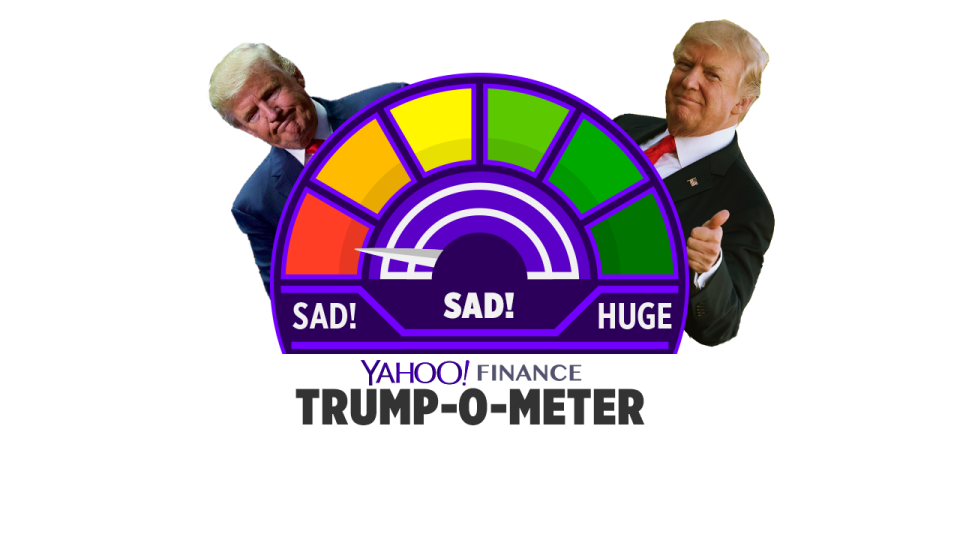This week in Trumponomics: Enough tariffs already!
This is getting old.
When in doubt, President Trump threatens tariffs. He has slapped them on some steel and aluminum imports, and warned China that he might tax $150 billion worth of its imports to the United States. And now, Trump is pondering tariffs of up to 25% on 8 million imported cars Americans buy each year.
Tariffs are essentially a tax, paid largely by whoever purchases the product—in this case, car buyers. So a $25,000 car hit with a 25% tariff would suddenly cost more than $31,000. Such Trumpian tariffs would cause upheaval in an otherwise mature industry, forcing automakers to tear down and rebuild global supply lines. Since the latest Trump tariffs would be both anti-consumer and anti-business, our Trumpometer this week points to SAD!, our lowest rating.

Trump seems frustrated by the difficulty he’s having renegotiating the North American Free Trade Agreement, with Canada and Mexico objecting to US demands for more auto production in the United States. It’s hard to sympathize with Trump on this. He wants more high-paying manufacturing jobs in the United States, but his methods would raise prices for consumers, dent automaker profits and rupture supply chains manufacturers have spent decades putting in place. Mexico and Canada are also able to retaliate against US demands that would harm their economies by putting new barriers in place on American products, especially agriculture.
[Check out our Trumponomics Report Card.]
When Trump doesn’t get his way on trade, he hollers, “TARIFFS!” Originally, this got everybody’s attention. But it’s starting to become a hollow threat. Many countries got exemptions from the steel and aluminum tariffs, and Japan may challenge them at the World Trade Organization. The stock market fell every time Trump threatened tariffs on China, and he now seems to have backed down on those. The market quivered on news of the auto tariffs as well, and it would send a much more urgent message if they ever went into effect.
Most of the big foreign automakers Trump wants to tax have factories in the United States, where they employ hundreds of thousands of Americans. Those companies enjoy political support from lawmakers in places like Tennessee (where Volkswagen and Nissan have plants), Kentucky (Toyota), Ohio (Honda), Mississippi (Toyota and Nissan), Alabama (Hyundai, Honda and Mercedes-Benz), South Carolina (BMW), Georgia (Hyundai, Kia and Mercedes), Texas (Toyota), Indiana (Subaru and Toyota) and so on. Tariffs would harm domestic automakers as well, because they import some models from Mexico, Canada and other countries. That’s why members of Congress greeted Trump’s latest tariff idea with derision.
The Trump machinery moves forward, however. At Trump’s behest, Commerce Secretary Wilbur Ross will now oversee an investigation into whether auto imports damage America’s national security. If the investigation finds that they do, that will be the pretext for Trump to impose tariffs, if he’s really willing to send stocks reeling.
The legal authority for this charade comes from a law passed in 1962, a time when there still was the potential need to mobilize the nation’s auto infrastructure for the production of war machinery, as in World War II. Nobody thinks that need exists today, and even if it did, there are already more than 40 car factories spread across the country.
The Commerce review will take several months, so we may not hear much about this idea for a while. But it could return in the fall, or in 2019. If you need a new car, you’ve still got a few months.
Confidential tip line: rickjnewman@yahoo.com.Click here to get Rick’s stories by email.
Rick Newman is the author of four books, including Rebounders: How Winners Pivot from Setback to Success. Follow him on Twitter: @rickjnewman
Follow Yahoo Finance on Facebook, Twitter, Instagram, and LinkedIn

